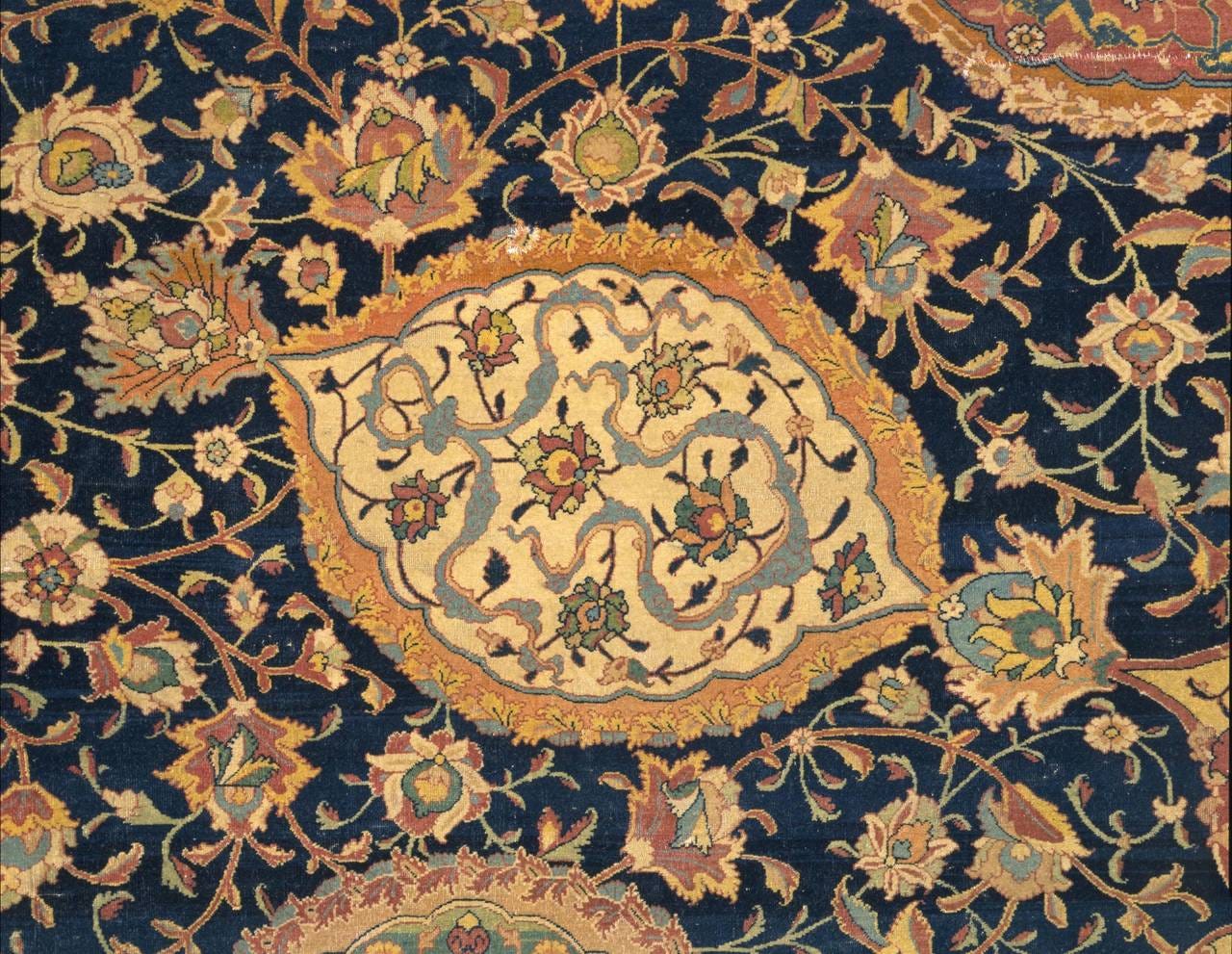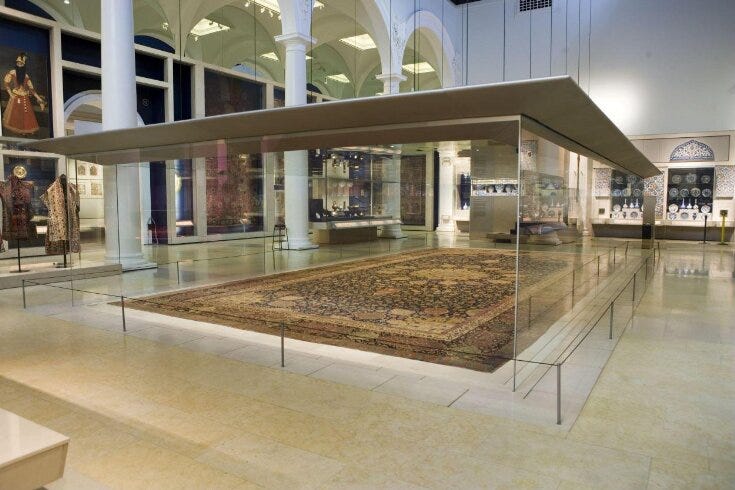A Deeper Look - Issue #9 | Mar 7 2021
The Morning Commute, the Pope in Iraq, and ARK Invest's 2021 Big Ideas Report
Hi Friends,
A bit late today I know, but things ran away from me this weekend.
Today we unpack several items and take a look at their wider significance:
Weekly Reflection
[Speech] Interrreligious Meeting, Pope Francis, Iraq, 6 March 2021
[White Paper] Innovation and ARK Invest’s 2021 Big Ideas Report
Artefact of the Week
Weekly Reflection:
I have noticed a small habit, and I wonder how many of you have observed the same. Often when the car pulls up to the driveway after the drive home from work there is small moment of time, perhaps five minutes, perhaps ten… and in some cases fifteen or twenty before one gets out of the car and walks into the house.
What happens in these precious moments of time? For some it is a chance to catch up on emails, for others a minute to listen to the latest news report, and for others an opportune moment to wrap up a few last minute phone calls.
I have a different theory. I think this moment is also one of transition.
The Canadian born sociologist Erving Goffman in his book the Presentation of Self in Everyday Life draws on the metaphor of theatre to explain how individuals adopt different roles when interacting in different settings or stages of life. These moments in the car, after we have finished work, but before we enter the house can be thought of as an intermission, a space in which we are not at work, but not yet home. It is a liminal space: where we have not yet shed the trappings of our work lives, but have yet to put on the mask we wear when we step into the house.
I say mask because we do not reveal the entirety of who we are to those we love. Now some of you may be skeptical - but I would ask you pause and think back. Think to a time when your significant other has had a phone call from a friend or colleague. Think of the sound and tone of voice one adopts, I suspect it will be markedly different from the one you ordinarily hear at home. This is a glimpse into a different life and a different world, one to which you sadly do not, and will likely never have access to.
It is interesting to note that the word commute comes from the latin mutare, meaning to change or transform, and so it is fitting that the commute home is a space and time where, in the silence and midst of transition, we are most truly ourselves.
In the spirit of spring, I would like to share with you a small sample of songs that have formed part of my morning commute playlist:
Dreams Come True - Daryl Hall and John Oates
Africa - Toto
Baby I Love Your Way - Peter Frampton
Escape (The Pina Colada Song) - Rupert Holmes
O Saathi - Atif Aslam
I would also love to hear your feedback, if you do have a moment please do leave a comment!
[Speech] Interrreligious Meeting, Pope Francis, Iraq, 6 March 2021
Last week Pope Francis made a historic visit to Iraq where he gave an address that touched on the common figure of Abraham, a uniting figure among Muslims, Christians and Jews alike.
He began with the reminder that “today we, Jews, Christians and Muslims, together with our brothers and sisters of other religions, honour our father Abraham by doing as he did: we look up to heaven and we journey on earth. We look up to heaven. Thousands of years later, as we look up to the same sky, those same stars appear. They illumine the darkest nights because they shine together.”
He used the opportunity to sow seeds of unity, commenting on the pandemic, the threat of individualism, and the importance of peace. Below are selected excerpts:
The Pandemic and Individualism: “The pandemic has made us realize that “no one is saved alone.” Still, the temptation to withdraw from others is never-ending, yet at the same time we know that “the notion of ‘every man for himself’ will rapidly degenerate into a free-for-all that would prove worse than any pandemic.” Amid the tempests we are currently experiencing, such isolation will not save us. Nor will an arms race or the erection of walls that will only make us all the more distant and aggressive. Nor the idolatry of money, for it closes us in on ourselves and creates chasms of inequality that engulf humanity. Nor can we be saved by consumerism, which numbs the mind and deadens the heart.”
On Peace: “There will be no peace without sharing and acceptance, without a justice that ensures equity and advancement for all, beginning with those most vulnerable. There will be no peace unless peoples extend a hand to other peoples. There will be no peace as long as we see others as them and not us. There will be no peace as long as our alliances are against others, for alliances of some against others only increase divisions.”
On The Economy “It is up to us to shed light on the shady manoeuvres that revolve around money and to demand that money not end up always and only reinforcing the unbridled luxury of a few. It is up to us preserve our common home from our predatory aims. It is up to us to remind the world that human life has value for what it is and not for what it has. That the lives of the unborn, the elderly, migrants and men and women, whatever the colour of their skin or their nationality, are always sacred and count as much as the lives of everyone else!”
Innovation and the Future: ARK Invest - 2021 Big Ideas Report
ARK Investment Management LLC (Ark-Invest) is an asset management company founded by Cathie Wood in 2014. Ark Invest manages a number of exchange-traded-funds (ETFs). A large part of media coverage has surrounded one of ARK’s ETFs titled: ARK Disruptive Innovation (ARKK). This is a thematic ETF, in that it revolves around the theme of “disruptive innovation.” The fund’s prospectus defines disruptive innovation as:
“the introduction of a technologically enabled new product or service that potentially changes the way the world works… companies relevant to this theme are those that rely on or benefit from the development of new products or services, technological improvements and advancements in scientific research relating to the areas of genomics, innovation in automation and manufacturing, transportation, energy, artificial intelligence and materials, the increased use of shared technology, infrastructure and services, and technologies that make financial services more efficient.”
At the end of January Ark-Invest published its Big Ideas 2021 Report, a white paper that closely examines the market potential and long-term impact of “disruptive innovation.” The paper is interesting not only because of the trends it presents, but its view of the world and where we are headed, it lays out 15 “investable and long term big ideas” that range from growth of virtual worlds and gaming, to delivery drones, to orbital aerospace to bitcoin and automation to cell and gene therapy.
One example is digital wallets which ARK-Invest says are valued at between 250$-1900$ today but could “scale to 20,000$ per user representing a 4.6 trillion opportunity in the US by 2025”
Overall, the list makes for interesting reading, and serves as a fascinating investment thesis. My purpose is not to dive into the financials but to comment on what this report means for how we think about innovation, industry and society today.
Observations on Innovation:
Purpose of Innovation: Examining what is absent in the report is as revealing as what is. There is little if any mention of disruptive innovation in the areas of climate change, of the water industry, of education, of public infrastructure, or healthcare delivery. In fairness ARKK has defined disruptive innovation as the introduction of a product or service in the way the world works, it does not claim to invest in disruption that seeks to better the world or respond to its most pressing issues. The lack of a direct focus on these issues specifically speaks loudly about our motivation for innovation.
The scholar Benoît Godin on the history of the concept of innovation has observed:
Some words have… nothing but a halo, a “mystique by which a whole society lives” (Lewis, 1960: 282). The word seeps into almost every sentence. Over the twentieth century, innovation has become quite a valuable buzzword, a magic word. Innovation is the panacea to every socioeconomic problem. One need not inquire into the society’s problems. Innovation is the a priori solution.
The Time-Horizon of Innovation: The report also provides a sense of the time scale with which we think of and approach innovation. We are in an age of exponential growth. The main focus of ARK’s report is innovation in industries which have only recently been established, and in the context of human history are still very much new. To speak of disruption in the industries of automation, of space exploration, of genomics and of cryptocurrency is to put the cart before the horse. We have not even understood the full potential of these industries on our lives let alone the planet. Disruption upon disruption without taking stock of what we have already disrupted sets the stage for a future of uncertainty and increasing unpredictability.
The Nature of Innovation: The report paints a picture of innovation in the services (financial services, Bitcoin, autonomous ride hailing, drone delivery) rather than physical products. What does this mean for innovation? I think this makes it harder for us to understand. Digital and tech innovation is abstract, we cannot see or physically grasp the change in one iteration to the next. We have entered an age in which innovation is more abstract rather than tangible. These innovations, ones which we cannot see or hold, are dangerous in that we do not recognise the scale of change they have introduced into human affairs until it is too late. How do we prepare for a world of change in a world where the nature of change is becoming harder and harder to grasp?
Artefact of the Week:
This week’s artefact of the week comes from the V&A’s Islamic Middle East Collection. The image below is a detail of the Ardabil Carpet, one of the largest Islamic carpets in existence. (the question of what makes a carpet Islamic is one for another day). It is a piece which I have had the privilege of seeing in person, and takes me back to the happy years I spent in London. The carpet was produced in Iran in the year 1539-40. The description on the website reads:
It was commissioned as one of a pair by the ruler of Iran, Shah Tahmasp, for the shrine of his ancestor, Shaykh Safi al-Din, in the town of Ardabil in north-west Iran. In a small panel at one end, the date of completion is given as the year 946 in the Muslim calendar, equivalent to 1539-40. The text includes the name of the man in charge of its production, Maqsud Kashani.
The carpet is remarkable for the beauty of its design and execution. It has a white silk warp and weft and the pile is knotted in wool in ten colours. The single huge composition that covers most of its surface is clearly defined against the dark-blue ground, and the details of the ornament - the complex blossoms and delicate tendrils - are rendered with great precision. This was due above all to the density of the knotting - there are an average of 5300 knots in every 10 square centimetres (340 knots per square inch).
Until next week and thanks for reading,
FK




